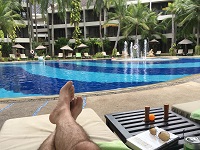The take-away from Drs. P and Yo yesterday was: A
Post# of 157705

We, being in CYDY are in the right place. As of late there has been a lot talk about the results reported by Relief Therapeutics Aviptadil with their VIP (vasoactive intestinal peptide). Indeed if the anecdotal results of the paper confirm the drug seems to work (is currently in trials)
Why ?? Well, as Dr. Yo suggested: surprise, surprise it inhibits RANTES !!! The paper published in Granada, Spain (2004) is VERY interesting in that explains the knowledge (then) of few pro-inflammatory processes and links Leronlimab to RL-100:
https://pdfs.semanticscholar.org/df0e/06c342b...1597891970
Quote:
We reported that VIP inhibits the expression of two CXC chemokines (CXCL2/MIP2 and CXCL1/KC), and of four CC chemokines (CCL3/MIP1α, CCL4/MIP1β, CCL2/MCP1, CCL5/RANTES ), in LPS stimulated macrophages and microglia(21, 34). The inhibition is mediated by VPAC1 and correlates with a reduction in NFkB binding and transactivating activity. The two CXC chemokines CXCL2 and CXCL1 function as chemoattractants for neutrophils, whereas the CC chemokines attract monocytes/macrophages and T cells.
Quote:
Regarding its effect in joint inflammation, VIP strongly reduces the inflammatory response during arthritis development by down-regulating the production of several pro-inflammatory agents in the inflamed joints and synovial cells, including TNFα, IL-6, IL-1β, iNOS, IL-12 and IL-18, as well as various chemokines ( RANTES , MCP-1, MIP-1α, MIP-1β, MIP-2) reported to play a role in inflammation and in the development of the arthritic responses.
So, we are probably the reason why RL-100 works (I am not saying this in a demeaning manner). Why? well, Itolizumab (the Biocon’s India drug) also has a relationship with RANTES, which has secured approval from the Drugs Controller General of India (DCGI) for emergency use in Covid-19 patients. “Itolizumab, by binding to CD6, down regulates T cell activation, causes reduction in synthesis of pro-inflammatory cytokines and possibly plays an important role by reducing T cell infiltration at sites of inflammation”
https://www.jimmunol.org/content/204/1_Supplement/142.18
Guess what ?? anti-CD6 drug reduces RANTES
Quote:
Histology also significantly improved with anti-CD6 treatment (p<0.05). RT-PCR revealed significantly decreased levels of VCAM and RANTES in the kidneys of treated mice, while anti-inflammatory IL-10 was increased, compared to vehicle control mice. Flow cytometry analysis indicated decreased accumulation of both renal-infiltrating activated T cells (CD4+CD25+CD69+, p <0.01) inflammatory macrophages (p<0.05). Overall, these results indicate that the CD6-ALCAM pathway is an important driver of inflammation and pathology in LN and, thus, a promising therapeutic option that is more selective than the immunosuppressive therapies currently offered.
Some of the drugs that have shown benefit: Aviptadil, Itolizumab and Leronlimab have one thing in common: they all modulate RANTES/CCR5 axis. Now, which one modulates it better ???.
If RANTES is the quarterback, which team would you rather be in ???
 (13)
(13) (0)
(0)